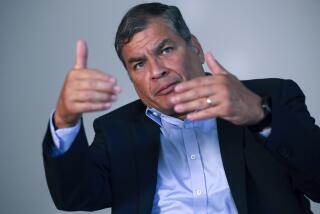U.S. Should Patiently Push Chile Toward Reforms, Experts Say
- Share via
WASHINGTON — When voters in Chile chose the uncertainties of democracy over a continuation of strongman rule by Gen. Augusto Pinochet, they started a drawn out process that will provide a severe test for the patience and skill of the next U.S. president.
The Reagan Administration has maintained steady pressure on Chile to hold free and fair elections, and American officials immediately hailed Wednesday’s plebiscite, in which voters rejected Pinochet’s bid for eight more years as president, as just that.
But Chile’s constitution allows Pinochet to hold power for 17 more months, while plans go forward for holding competitive presidential and congressional elections late next year. U.S. officials and outside experts agree that Washington must continue to press for an orderly transition to civilian rule without overplaying its hand and giving Pinochet an excuse to reimpose dictatorial measures to stop U.S. interference in Chile.
“We don’t know whether our pressure helped (the outcome of the plebiscite) but we hope so,” one U.S. official said. “Obviously, our interest is in seeing the process move forward. The Chileans have made a good start.”
The official said that Washington will not modify the chilly nature of its present official relations with Pinochet’s government until the transition toward democracy is much farther along. He said, “We’re not backing away from the sanctions that have been imposed--all of the things that have been suspended will remain so.”
But in less than four months, a new Administration will be in place in Washington. There may be a temptation to take action regarding Chile. Most private experts say the new Administration should resist that urge.
“There are really no initiatives the United States ought to take in this sort of thing,” said G. Pope Atkins, a U.S. Naval Academy professor and an expert on South America. “We have had such bad relations with Pinochet over the past few years that there really is just not much leverage there.”
Nevertheless, Atkins said that Washington should make it clear that “the United States and Chile will not be able to normalize relations unless the transition to democracy takes place.”
Before Pinochet came to power in a bloody military uprising in 1973 that ousted the elected president, Salvador Allende, Chile had an almost uninterrupted history of civilian administrations dating back to 1833. Chile has rated high on the list of nations considered important to U.S. policy-makers, so much so that the CIA in the past has sought to bolster friendly Chilean administrations and to destabilize antagonistic ones.
The stakes in Chile remain high for the United States, although the Pinochet regime has been isolated diplomatically and, as a result, has become less of a pivotal country in South America than it was before the coup.
“There has been a deliberate effort to isolate the Chilean regime,” said Riordan Roett, director of Latin American studies at the School of Advanced International Studies of Johns Hopkins University. “The Chileans have not been included in any of the major collective efforts of the early 1980s.” Also, the United States regularly opposes loans to Chile from international lending institutions.
“The carrot that the United States and the Latin American countries can hold out (if Chile completes its transition to democracy) is that Chile can take its place again at the conference table with other Latin American nations,” Roett said.
The last time Chile held a free presidential election, in 1970, Allende, a Marxist, captured the office, although he received only slightly more than a third of the vote against divided opposition. According to information revealed by a U.S. Senate committee in 1975, the CIA sought to dislodge Allende through covert means. Earlier, according to testimony obtained by the committee, the United States provided secret financial aid to elements of the centrist Christian Democratic Party. Leaders of the party categorically denied that they were aware of such aid.
Most outside experts agree that it is unlikely that the elements of Chile’s Marxist left, which formed the backbone of Allende’s government, will win the next election, which, under the constitution, is supposed to be held by Dec. 11, 1989. The Chilean public still recalls vividly the economic chaos of the Allende years.
More to Read
Sign up for Essential California
The most important California stories and recommendations in your inbox every morning.
You may occasionally receive promotional content from the Los Angeles Times.













